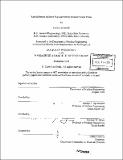Risk-informed incident management for nuclear power plants
Author(s)
Smith, Curtis Lee, 1966-
DownloadFull printable version (17.70Mb)
Other Contributors
Massachusetts Institute of Technology. Dept. of Nuclear Engineering.
Advisor
George E. Apostolakis.
Terms of use
Metadata
Show full item recordAbstract
Decision making as a part of nuclear power plant operations is a critical, but common, task. Plant management is forced to make decisions that may have safety and economic consequences. Formal decision theory offers the potential for a structured approach capable of taking into account risk-related aspects (plant and worker safety, for instance) and, at the same time, important factors like economics and regulatory requirements. Since power generation involves large capital and operational costs, making the decision process more efficient can lead to significant economical savings. With millions of dollars at stake, it is imperative that operational decisions be made in a logical and consistent fashion. In addition to the monetary concerns, a primary driver for this work is the desire to make defensible decisions. Within a structured organization like a nuclear power plant, a variety of interactions take place between groups of decision makers. These groups are asked to provide guidance on a variety of issues, ranging from complex regulatory requirements to planning maintenance activities of standby equipment. By providing an integrated package for decision making, it is believed that tools like the plant risk assessment can be used in a defensible manner as part of the day-to-day operation of the facility. The goal of this report is to describe a decision methodology for nuclear power plant incidents. Here, incidents are categorized as plant upsets that are not serious challenges to plant safety, but nonetheless require an appropriate response. (cont.) As part of this decision methodology, risk assessment, worker safety, economics, preferences, and formal decision making models make up the foundation. We describe the construction, analysis heuristics, and inherent uncertainty of these models. From this methodological framework, we developed a prototypical on-line advisory tool that provides decisional advice relevant to incident management. The capabilities of this prototype are discussed along with a demonstration via case studies.
Description
Thesis (Ph. D.)--Massachusetts Institute of Technology, Dept. of Nuclear Engineering, 2002. "September 2002." Includes bibliographical references (p. 235-244).
Date issued
2002Department
Massachusetts Institute of Technology. Department of Nuclear Engineering; Massachusetts Institute of Technology. Department of Nuclear Science and EngineeringPublisher
Massachusetts Institute of Technology
Keywords
Nuclear Engineering.